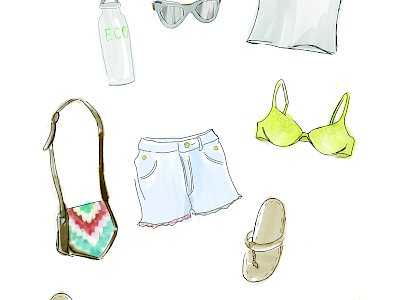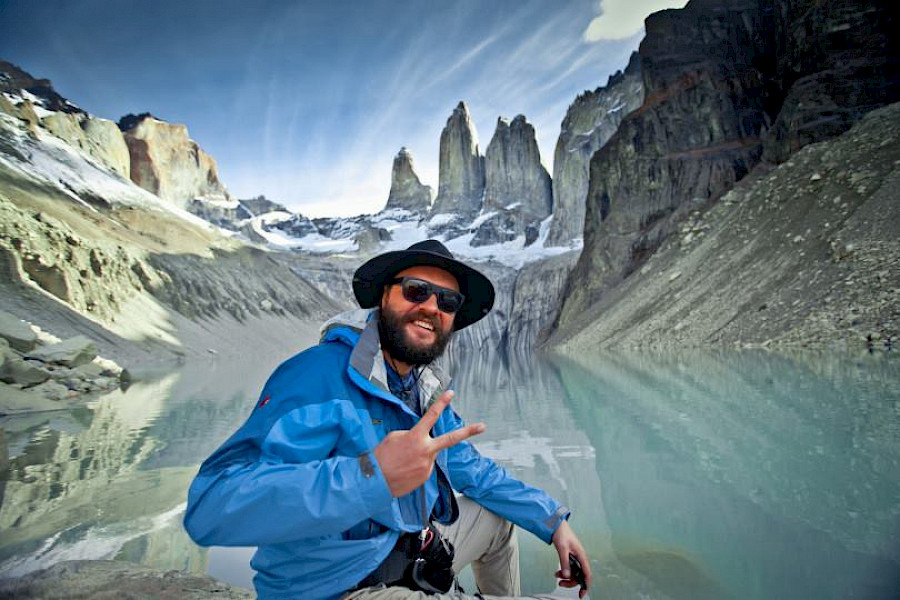
Back in summer 2019, a presentation of the project “Around the world in 180 days with Farid Novruzi” was held in Baku. He took this relay over from Ukrainian TV journalist and presenter Artemy Surin who travelled all over the continents, crossing the oceans without the help of airplanes and shooting the entire trip in order to submit an application to the Guinness Book of Records. Is it a joke? It was the first journey around the world that was wholly shot by a drone! Artemy especially travelled to Baku to talk about what it feels like to spend long months traveling around the world, what you need to be prepared for and what in Baku is good through the eyes of an avid traveler. Six months later, when the journey of Farid Novruzi began in faraway Bogotá, we share the story of Artemy and his advice for those who want to travel around the world.
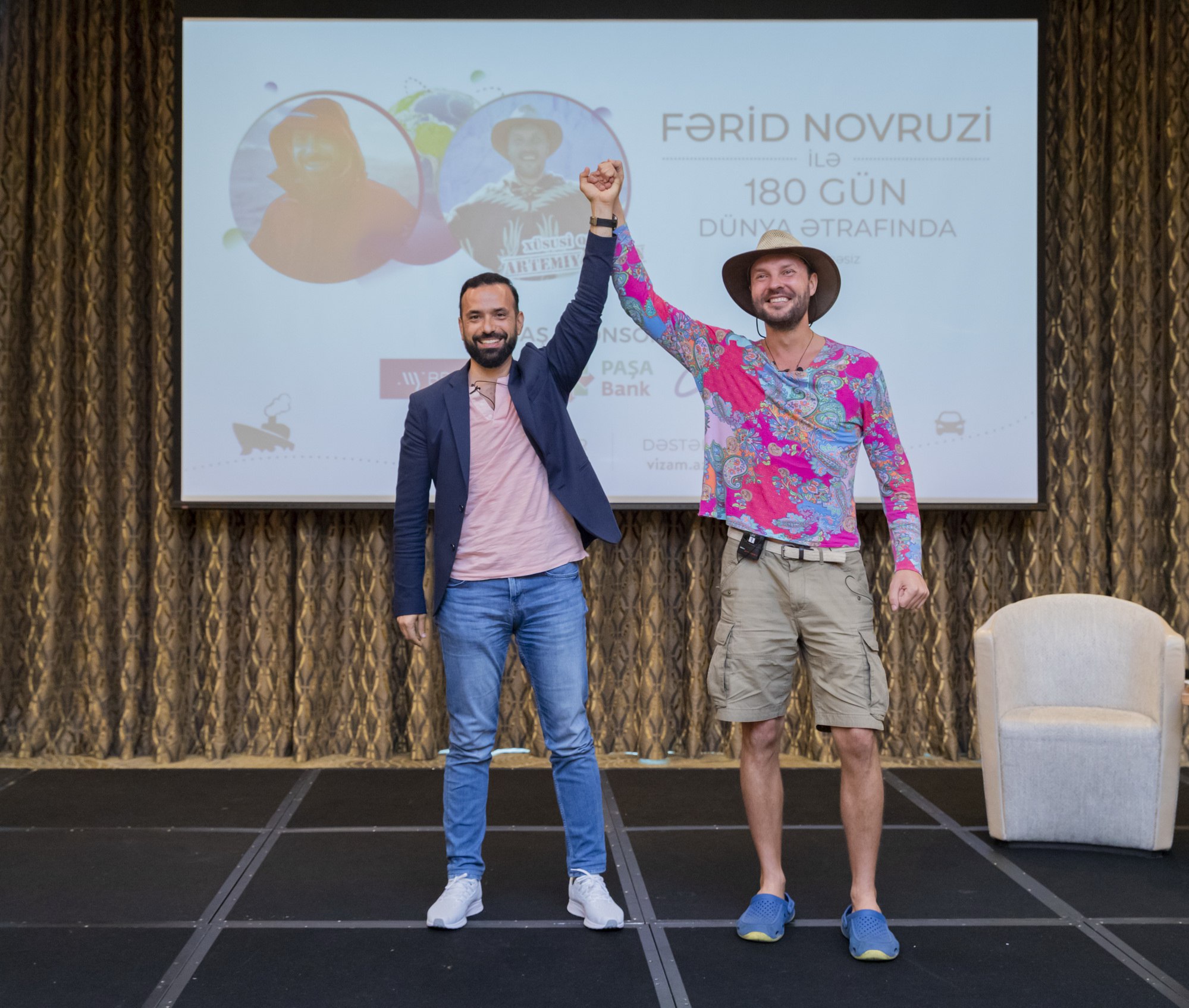
– The most difficult thing around the world is not money or time. The hardest thing is to decide. We often tell ourselves that it is long, expensive, and dangerous and so on, but the world is now open as never before. Thanks to the Internet, you can instantly receive all the information – where to stay, how to get there, what is the situation with the border. On the other hand, long trips, especially without flights, are not suitable for everyone. You must understand that this is the most powerful way out of the comfort zone. In my case, it is 180 days, half a year, in the case of Farid Novruzi it is nine months. You actually leave everything – your house, your family, quit whole business, etc. For this you don’t lose anything, vice versa, but you’ll only get it, because you will get enormous experience and inspiration by communicating with people who meet in your way. Overwhelming majority – they are bright people who are ready to help you, regardless of whether you are somewhere in Nicaragua, in French Polynesia, in the Sahara desert or in Antarctica – and this is very encouraging. I also had a lot of experiences: If I can, what will happen to my relationship with a loved one, what will happen to my business... what will happen to me in general? Both Ukraine and Azerbaijan, our countries are quite young in terms of independence, in terms of the traveler’s position: we got the opportunity to travel relatively recently, while Western Europe and America have long had this opportunity. But now, having all these technologies and a passion for travel, we can show the world: Listen, guys in the highlands or somewhere in the tribes, there is such a country, Azerbaijan, I came from there and make a trip around the world. Thus, you form a very strong promo and image of your country.
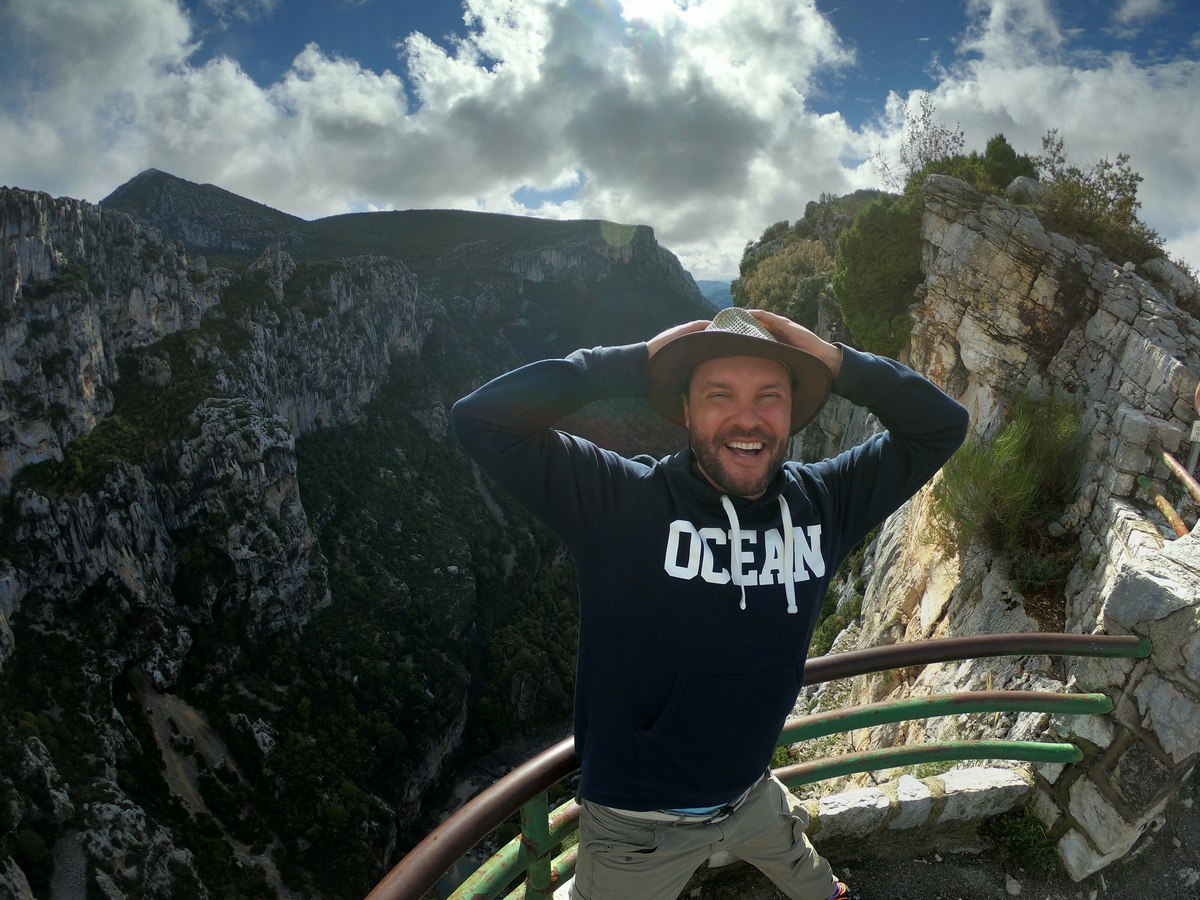
What memory do you consider the most pleasant or funniest in these months?
Objectively, the brightest thing is that I am in Baku. As for other places, the places where the person was minimally present were most impressive... On the African continent, this is the Sahara desert, when you manage to delve into it with a caravan, you are in the depths of the desert and the full moon shines... We shot with cameras, without raising ISO, without using additional lighting, and the light was like a day in Baku. Still silence of the desert ...Even if you live outside the city, you are always accompanied by some kind of noise, even the rustling of trees. And in the desert there is not a single sound, and for the first time in your life all your receptors feel this total purity. The next point, which also struck, is, of course, Antarctica. This is the cleanest continent, in fact there are only penguins, icebergs, killer whales and no humans.I would also highlight the inaccessible region, which is located in the middle of the Pacific Ocean, the largest and deepest ocean in the world. The crossing of the Pacific Ocean took me one month and five days on several ships, and there were a number of unique places that I managed to visit. The first is the farthest point on the planet from Baku, Pinker Island. The nearest land – New Zealand – is located at a distance of 5000 km. This is a place beyond which there is none at all. Here we can say: "I know where the hell is." This is a very interesting island, 48 people live on it. They live very apart, I managed to get to know 44. They practice incest, they have very strange customs, there are unpleasant social nuances, but if you distract from them, this island is very interesting. Farid also has a point on the way where many would dream to visit, and if there is a dream, then there is a goal. This is French Polynesia and a scattering of islands, the most famous of which is Bora Bora. In general, Polynesia is a very charismatic region, filled with traditions and the spirit of island life, as we imagined it, reading Thor Heyerdahl’s books and adventure novels. The same globalization, thanks to which we fly comfortably to any country, erases the charisma and authenticity of specific countries, and there are very few untouched places. Now you fly to New Zealand, Mexico, North America, come to the central city - all, in principle, the same thing. There will be KFC, and the same brand stores, and Uber... unwittingly you begin to appreciate those countries that were able to maintain their authenticity. Near Colombia there is a small archipelago – San Blas. As you know, there is an American highway that starts in Alaska and reaches the very south, and there is one segment that this highway does not cover. From Central America, from Panama, without flights, you can get to Colombia only by water.And by water, you cross the San Blas archipelago. These are small islands similar to the Maldives: palm trees, sand... The wonderful Kuna people live there – the Indians, whom civilization did not really touch. This is a powerful impression! Recently in Pakistan, they managed to get to the Hunza tribe, perhaps you heard about it, it is a tribe of centenarians.For them, living over a hundred years is the same as for us, say, up to 70. They eat apricots, this is their main diet, vegetables, feta cheese, and in the winter they include meat in their diet. The Hunza live at the junction of three mountain systems, and this is an interesting people who have not lost their authenticity.
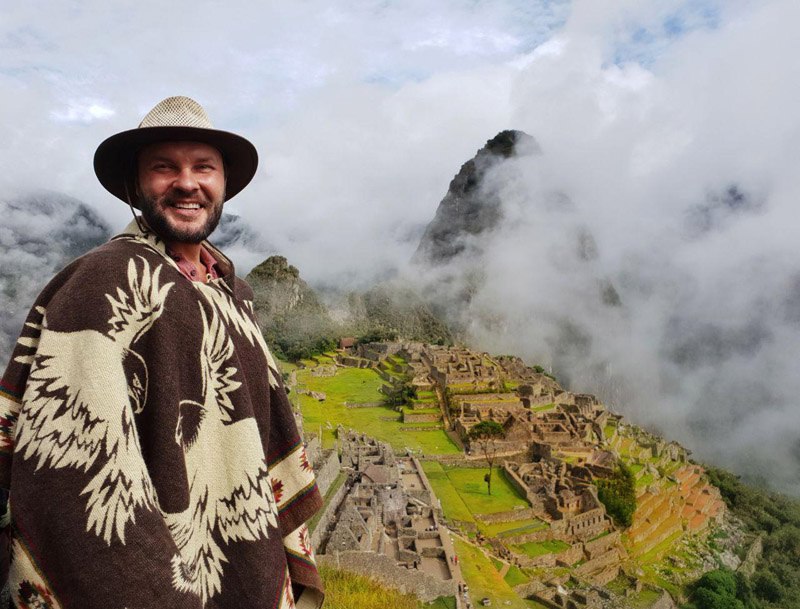
What was the most difficult part of your journey?
I think this journey is the most serious thing I've done in my life. The biggest difficulty is separation from your beloved. No matter how you tune in, you still objectively miss your family and home. At the same time, my love flew to me three times, and we went through several stages together. Somewhere 2.5 of the 9 months of the trip we spent together, it supported us both very much. I assumed that at a certain stage of the path, a psycho-emotional crisis will come. I had it when I arrived in Asia from Australia on a container ship. I was completely devastated. I had no power to make a video. The fact is that I set myself the task of making videos, making a documentary, shooting for Youtube, you can watch the 15 episodes that were released there. But all this involves several hours of filming every day. And in the evening, when you come tired to the hotel and you want to sleep, it takes at least two hours to record a video diary, to record all the events of today for a book, overflow material, sort it, prepare cameras, and charge. And so every day. Moreover, you need to determine the route the next day and so on. And at some point I thought that I couldn’t do anything any more. It was necessary to do something to recharge. I got to Thailand and disconnected all communications for seven days, put down my camera, fasted for seven days, practiced yoga and sports, this allowed me to recover and continue shooting. This state is real complexity, everything else is a matter of patience. I have never traveled on a bus as much as in South America. One trip from Peru to Chile – 36 hours non-stop! The bus stops once at night to refuel, the toilet is inside. Complex travels were in India, when you cover the distance of 300 km in 26 hours, and along holes, kilometer cliffs. The bus rushes along them like a madman, 49 people inside, I am the 50th - and 49 people, by virtue of their religious beliefs, believe that if we die now, then everything is fine, there is reincarnation.And you are one of 50 worried whether you will reach or not. In Pakistan, I drove through the wonderful region of Balochistan: there you can’t take a single step without a convoy from three to five submachine gunners who carry you with roadblocks, and also cross somewhere around 500 km in 18 hours. You can endure all this physically – yes, your back hurts, there were big problems because of this, you carry bags, move out every day, move in, move... But this is all easier than separation from loved ones.
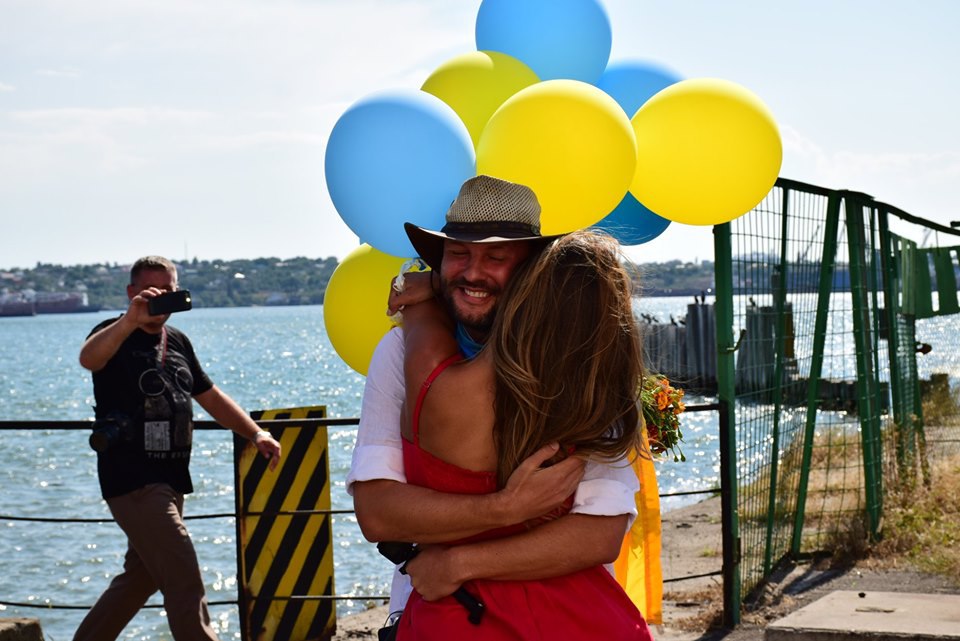
As for the container ship from Australia to Singapore, it was not a tourist ship, sailors worked on it, and they live in a completely different reality. A ship carries tens of thousands of tons of cargo, and you need to spend two weeks on it in the ocean. Your space is limited to a small cabin, a deck where you can sometimes walk on an oily floor, having previously put on a helmet and special boots, among cranes and deadly tired people: they can only sleep for three to four hours, as they must change. You approach them: “Hello, I’ve arrived, I’ll go with you!” – and they just look at you. And after you said hello for two weeks you can not wash machine oil from your hands. There was nothing familiar, so I had the opportunity to think about my life in general. There was some kind of insight. Of course, I guessed that some new awareness would come to me on the trip, but I thought it would be somewhere in India, next to the temples. That this will happen on a container ship – for me it was a surprise.
Have you had problems with the drone in any countries other than Iran?
No, there were no problems with the drone. It was difficult to bring it to Tunisia, because it was forbidden by them, then the cameraman and the director traveled with me, we just sorted it out to the smallest detail and put it in different bags. In addition, there was little difficulty in Antarctica, because they are also forbidden there, but managed to make friends with the Argentine captain, who gave the tacit consent to the shooting. For the rest, I tried to shoot only in those places where there are no secret objects nearby, in general there are no people, the main focus was on nature. There were four drones, two of them died. One – in the Columbia waterfall near Bogota, it flew too close to the waterfall because I was not a professional, I studied all this time, and a jet of water hit the drone. Second drone underwent a heroic death after returning from Antarctica to Ushuaia Bay. There was a strong wind, and somewhere in the fifth minute of shooting a flurry came up. I just stood and watched how this little drone could not fly against the wind. I saw it, I pressed it to fly to me, its battery dropped and it gradually went down before my eyes. After that I purchased the DJI Mavic 2 Pro and still shoot it, it is a successful model, powerful and with a good camera.
Did you feel the power of the Baku winds on you?
I felt a very pleasant breeze from the sea. In general, it seems to me that Baku has a very good location. In the four years that I have not been here, the city has made a quantum leap in several areas at once. When you travel, you have the opportunity to compare. I traveled here from Asia, starting from Singapore, then through Thailand, Malaysia, Myanmar, India, Pakistan, Iran – and throughout my journey it is the best capital. Firstly, you live in a very safe city, you can go out at two or three in the morning with the children and take a quiet walk. Believe me, this is not so common in the world. There are only a few such countries – in Australia, New Zealand, and Singapore, for example. Not even in the USA in all cities. In your area, you are a clear leader in terms of security. Secondly, I was struck by the cleanliness of Baku. You can compare with the same Singapore, Australia, New Zealand. In many countries of the world, garbage is simply thrown out of cars. Thirdly, you do not allow to mock your architectural old city. Fourth, Baku is good during the day, but when it lights up in the evening, it is very cool! Very competent illumination – all in a single concept, with a single color scheme, and almost everything is highlighted. Fifth, you have perfect roads. You look at this asphalt and understand why Formula 1 is held here. This is an opinion from a person who does not live here. You, living here, may not pay attention to it that way; for you, this is all familiar. And the person who has just toured 130 countries sees it all. You have something to be proud of.
By the way, I feel that you are striving to take an example from Dubai, that it is for you a kind of landmark. On the one hand, it's great, but on the other, you have something that Dubai does not have.Baku preserved architectural monuments that were not destroyed by the war in the last century and preserve history. And the most important thing is the soul of the city, it lies in people and their relationship to each other. I can stop on the street, ask a passerby – and they will help me, tell me. I want to wish you not to lose this phenomenal hospitality behind the rapid development.
Tell us about the advantages of this or that transport and about preparing for a trip around the world: what points do you need to consider when preparing and how long does it take?
I would recommend not messing with the car, because crossing borders with and without the car are two big differences. You need to have a special document for the car, in one of the certified automobile associations you have to pay the cost of your car as a deposit, which would guarantee to all countries that you cross that you will not sell this car there and so on. In addition, you must stamp this document on each border, it takes a lot of time. You can hire drivers, ride on buses, go boating – and you will be deprived of all this with a car. You will no longer board a container ship, a cruise ship, or any yacht with your own car. In addition, the car can always be rented. I would advise you to opt for traveling light.
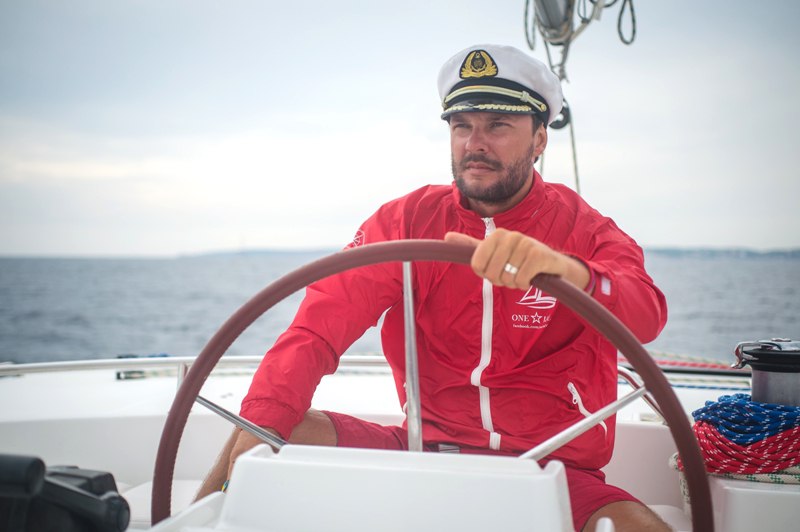
As for preparation, the most important thing is to work out the route. I dreamed about a world tour from childhood, ten years ago I began to think seriously, and a year ago I came to Thailand and somewhere in two weeks of hard work I developed a route. The main thing is to connect the intersections of the oceans. You must find the schedule of the ships, compare the time. The second point is visas. Unfortunately, we are all forced to apply for visas, go to embassies, and prove that we are not refugees or violators who want to emigrate. An American visa must be issued, but it works not only directly in the USA. With this visa you will cross all of Central America: Mexico, Belize, Guatemala, Honduras, Nicaragua, Costa Rica, Panama. All these countries have an American visa. Another thing to take care of: as a rule, visas are given with a corridor of three months. I had such a problem with French Polynesia when I started from Kiev on October 14, and was supposed to be in Polynesia in March. Moreover, Ukrainians do not need a visa to France, but already need French Polynesia. The embassy told me: You will be there in six months, we only have a visa for three months. The visa had to be issued along the way. When approached by three months before the entry into Polynesia – on the ship, and where the tickets were already bought – I was in the United States. Went to Houston, Texas, to apply for a visa. They say to me: you have a tourist visa, there is no residence permit and there is no reason to get this visa here, return it to Ukraine. So I traveled to the USA for three months without flights, I just need to return to Ukraine the same amount and again, and again there will not be enough time! Our team found out that in exceptional cases this visa can be given, but the ambassador of the country decides personally. You can’t imagine anything worse – for the French ambassador in Washington for some reason he had to enter the position of a Ukrainian who for some reason travels to Polynesia and cannot fly airplanes and needs to rush because he has some ships... I then realized: if you have any difficulties, contact your friends on Facebook, it really helps, we are not alone. People bring your issue to public comment. The Ministry of Foreign Affairs already helped me with this visa, and that's all... I didn’t have such ties. Nevertheless, visas need to be thought out in advance and very carefully.
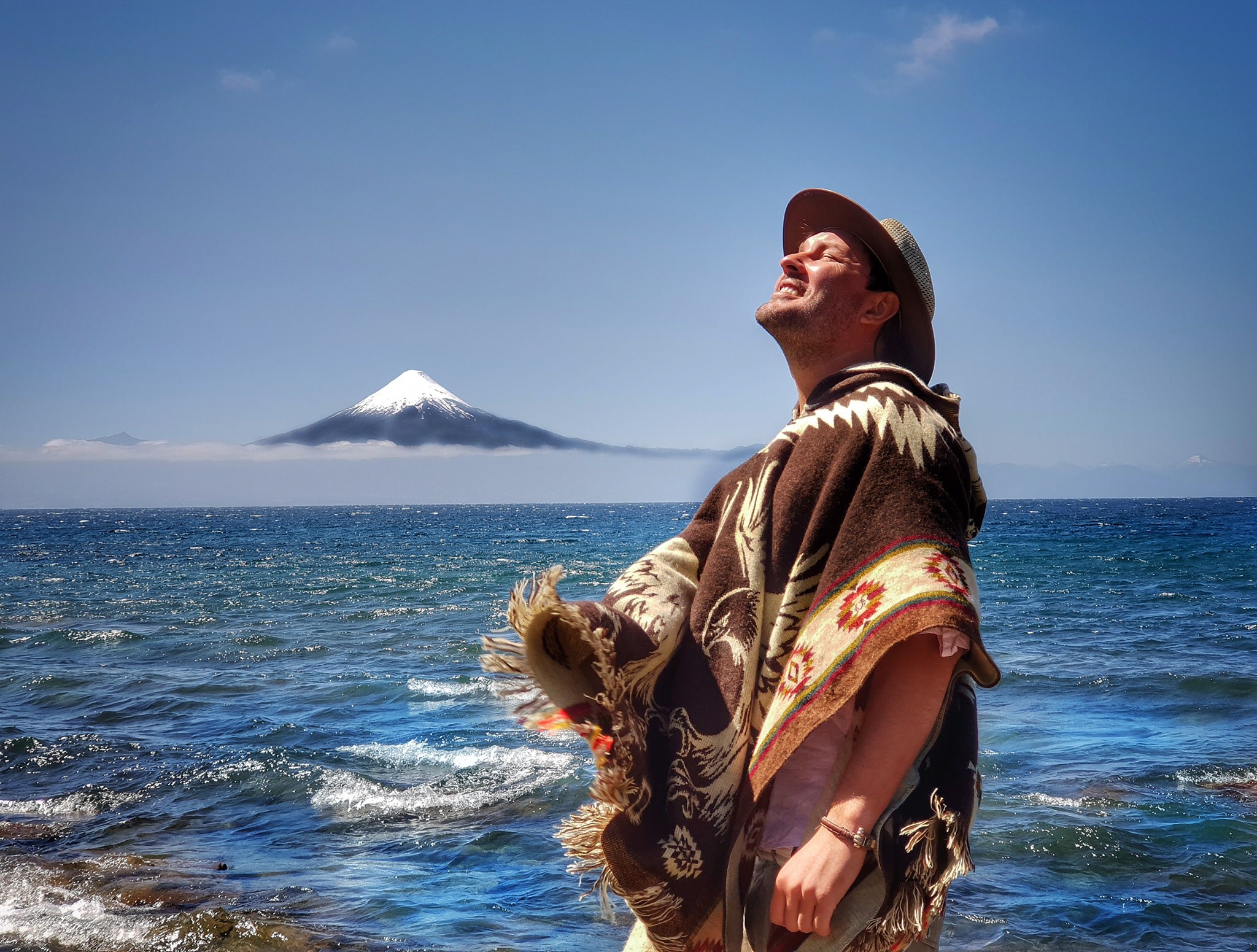
What five things besides gadgets do you always take with you on a trip?
Surely, of course, a passport. It should have a lot of free space, because the stamps will appear like mushrooms after rain. I took two passports with me. The second is a credit card. The third is a smartphone, the fourth is cash. I would recommend taking them anyway. My cash ran out when I entered Mexico, and I felt that depending on the card is not always convenient. Cards didn’t work in Iran again, so in Pakistan I withdraw cash from local ATMs, and the commission there is crazy, I lost some 20% of the amount... The latter is, of course, a technique, because it’s a shame if such a journey will have no memory if this cannot be shared with fellow countrymen. If you inspire at least one person, you have already done everything for good reason. About 10 days before departure, I wrote a post about what I would take with me, and there were medicines, antibiotics, bandages, tourniquets. They wrote to me: “This is not enough! Take more from allergies!” I say: "No allergies." They write to me: “It will be!” In general, I took a huge pack of drugs with me, later I threw away 90% of them. If there was a transformer bag, one like in IKEA , but bigger, I think it's perfect. The wheels are also needed, this allows you to not load your back on some stretches of the path. By the way, I noticed after myself: if you stay somewhere more than one day, you become limp and it’s harder for you to continue on your way. The Bedouins whom I met in the Sahara say: if you need to continue on, do not sit by the fire in the evening. The body receives a signal that it is possible to exhale, and then it is very difficult to assemble.
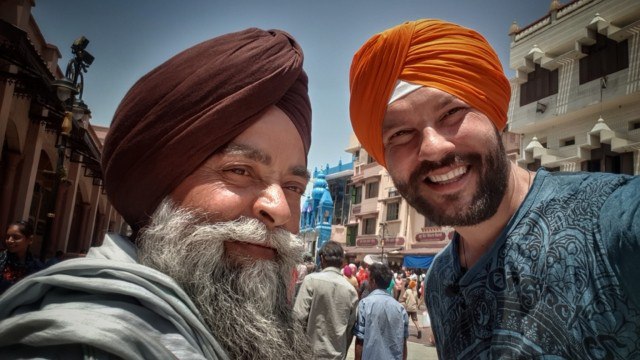
If you do not use airplanes, what budget do you need to plan for a world tour? And can people who are not financially wealthy go on a world trip?
Good question. You can travel in different ways, the budget, respectively, can be different. Traveling without flights is more expensive because there are a number of very expensive segments, such as crossing the oceans. According to my calculations, a round-the-world trip without flights can cost from $20,000. This amount will not allow you to earn extra money somewhere along the way, because there is such an option. It turned out much more expensive for me, because there were such expensive segments as the crossing of the Pacific Ocean. Antarctica is very expensive... plus, the cameraman and the director rode with me the first part of the way. I did not use hitchhiking because I had valuable cameras and, honestly, I was calmer to go by bus, with a ticket, or take an inexpensive car. At some point, in order not to be upset, I stopped counting the cost of this project. Initially, I thought that the project would cost about $100,000, but now I see that I have crossed the line of 120-130 thousand. We all have different opportunities, but if you have a passion for travel, do not limit yourself to a question of money. Set a goal, start thinking about it, take the first step – and you will see, everything will form. You will certainly have funds, friends and people who will help.
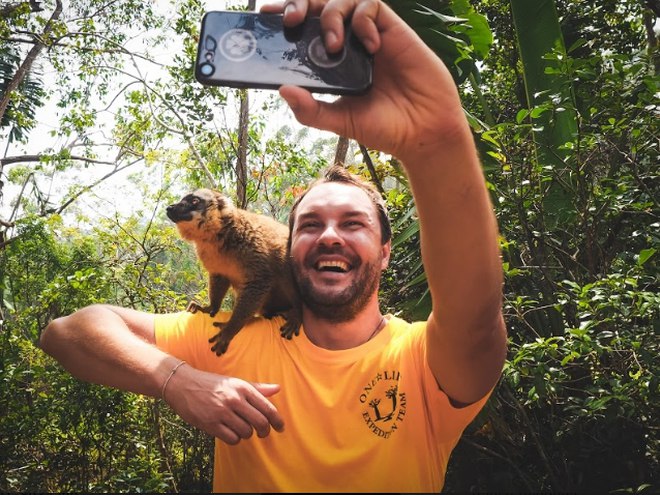
Photo: press materials


